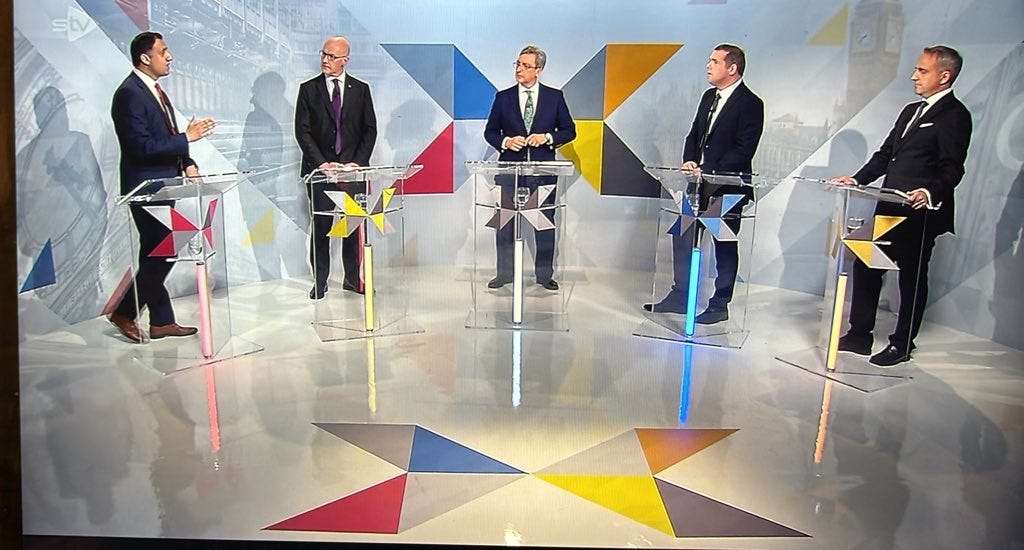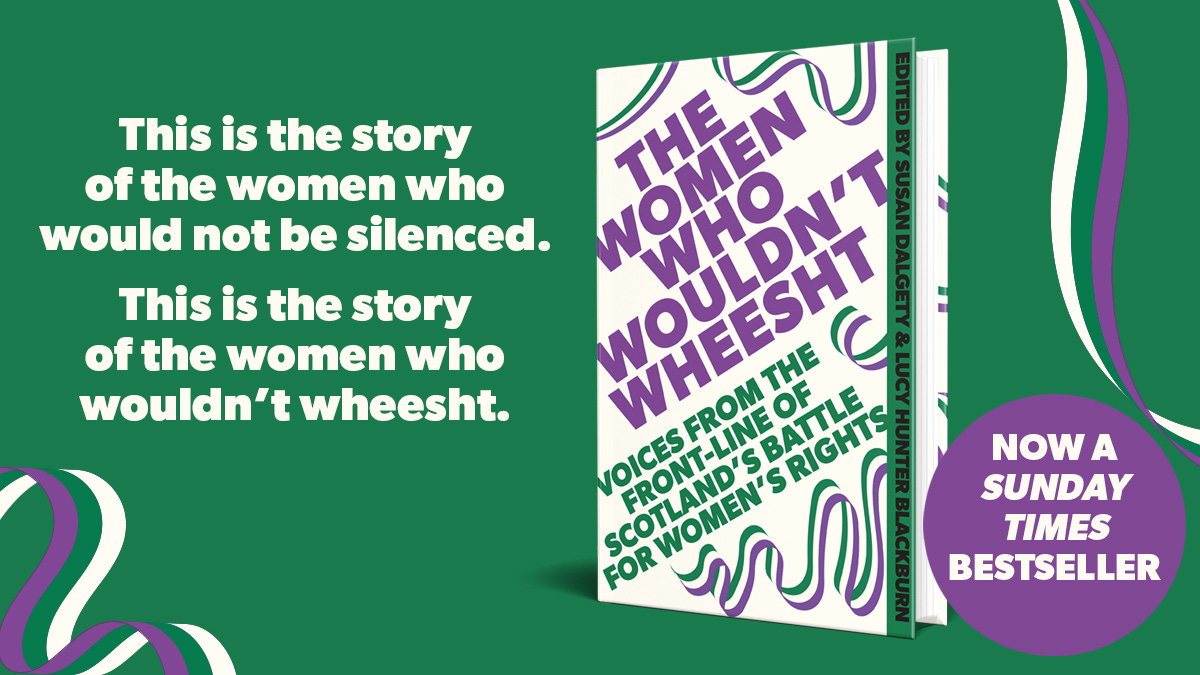We are probably experiencing the strangest general election of our lifetime, with the Prime Minister having to confirm that he will NOT resign before polling day, and the leader of the Scottish Tories handing in his resignation which will come into effect AFTER 4 July. But one thing has not changed - the imbalance of power between men and women.
Campaign group Elect Her has just released data which shows that only 30% of the candidates in the 2024 general election will be women, with 70% male. And despite all the work to achieve a balance of the sexes in politics, we are going backwards because the split in 2019 was 34% women and 66% men.
I wrote about the male dominance of our politics in the Scotsman on Saturday 8 June. You can read it here.
Putting women back in the political kitchen
Screenshot from STV’s leaders’ debate on Monday 3 June
Earlier this week, I found myself missing Nicola Sturgeon. It was ten minutes into STV’s leaders’ debate, where five blokes in identical suits were in danger of boring each other to death by soundbite, when the thought struck me. The debate looked like a throwback to the 1950s – where were the women?
After another ten minutes of tedium, I switched off and went back to social media, only to find Lord George Foulkes listing the politicians he thought should have been taking part in the debate. The veteran Labour peer was arguing, rightly in my view, that we should be listening to senior party representatives who were standing in the general election, not MSPs. He said, “The STV debate tonight would be more relevant…if it featured…” and went on to list, yes, you’ve guessed it, four men: Labour’s Ian Murray, David Mundell, of the Scottish Conservatives, the SNP’s Stephen Flynn, and Liberal Democrat Alastair Carmichael.
Where were the women? Lurking in the political equivalent of the kitchen, keeping the home fires burning, knowing their place, that is where. It is striking that after a decade of female party leaders in Scotland – Johann Lamont, Kez Dugdale, Ruth Davidson, Nicola Sturgeon – Scottish politics has reverted to its natural order. The men are back in charge. Westminster is worse. Labour has never had a female leader at UK level. Pedants beware: Margaret Beckett and Harriet Harman holding the fort for a few weeks while the blokes fought over the top job doesn’t count. Jo Swinson was leader of the Liberal Democrats – but only for five months in 2019. At least the Tories have given us three women Prime Ministers, even if the last one, Liz Truss, only lasted six weeks.
For a glimpse into how our political culture is still dominated by the male of the species, despite decades of ‘gender balance’ initiatives, I only had to rewind to a few hours before STV’s man-fest. On Monday morning, women and equalities minister Kemi Badenoch, announced that, if re-elected, the Tories would clarify the 2010 Equality Act so what when it spoke of “sex” it meant biological sex only. Her reasonable suggestion is promoted by a range of women’s groups including Sex Matters, and For Women Scotland is taking the argument that “sex” should be clarified to the Supreme Court, the highest court in the land. As the former Scottish Labour leader Johann Lamont has said, “The debate is not about changing the Equality Act but clarifying what always was its intent: to defend women against discrimination and abuse and allow women-only spaces and services.”
The blokes were having none of it. The First Minster, no less, took to the airwaves to argue that Badenoch’s proposal to protect women’s sex based rights was a cunning plan to undermine devolution. John Swinney told the BBC that plans to clarify the Equality Act "erode the powers" of the Scottish Parliament. If only women had known we were so powerful.
That most blokey of blokes, former Labour communications chief Alistair Campbell, questioned Badenoch’s priorities as trade and industry secretary, accusing her of weaponising “trans rights”, ignoring – whether deliberately or not – that she is also the minister responsible for women’s rights.
But perhaps the most astonishing comment came from a man who could be a cabinet minister in a few weeks’ time. John Healey, the shadow defence secretary, said on Times Radio, “We will not want to amend the Act, it’s not needed…This, to be honest, is a distraction from the election campaign.”
A distraction?
So there you have it. Women’s rights are a “distraction”. From what exactly, Mr Healey? From tackling the epidemic of violence against women and girls? Only this week, the Commissioner of the Metropolitan Police, Sir Mark Rowley, said the scale of offending by men against women was eyewatering. He said, “…this is way beyond policing and the justice system and we need a frank conversation about it, that looks at prevention work, protective work, as well as enforcement … work.”
If clarifying women’s rights on the basis of their biological sex is a “distraction”, what hope do the millions of women who deliver social care, either as poorly paid employees or as unpaid carers, have that Labour will take their concerns seriously?
And more and more women are being forced to give up work because of crippling childcare costs. Even if a woman manages to cling on to her career, her earning potential is restricted on the basis of her sex. Campaign group Pregnant Then Screwed points out that by the time a woman’s first child is twelve, her pay is one third less per hour than a man’s. Is Barbara Castle’s legacy of a woman’s legal right to equal pay and equal opportunities now a distraction, Mr Healey?
My granddaughter is currently doing a school project on democracy. She is fascinated by the process of elections, of being on a “team”, as she describes political parties. But what does she see when political debates on TV are men only? What does she hear when she is told by a male politician that her rights, based on her female sex, are a “distraction”?
As feminist philosopher Jane Clare Jones argued this week, “women are whole human people, with our own needs and interests and in order to protect our own needs and interests we need to have our own definition in law.” We also need women at the top table, not back in the kitchen making the tea.
The Labour Party will likely win the general election. Probably with a large majority. But will it govern as the party of John Healey or the party of Barbara Castle? The answer matters to all of us, and not just to 51 per cent of the electorate.
The Women Who Wouldn’t Wheesht is an instant Sunday Times best seller
The anthology of essays about the five-year campaign to protect women’s sex-based rights in Scotland has taken up a lot of my time in recent months. But it has been worth it to work with such and amazing group of women. And on Sunday, only days after it was published, the book made it into the Sunday Times bestseller list (hardback non-fiction) at number 3. Thanks to everyone who helped make that happen.
My co-editor Lucy Hunter Blackburn and I decided against a live book launch. Instead we worked with the amazing women of Filia to do one online. You can it here






